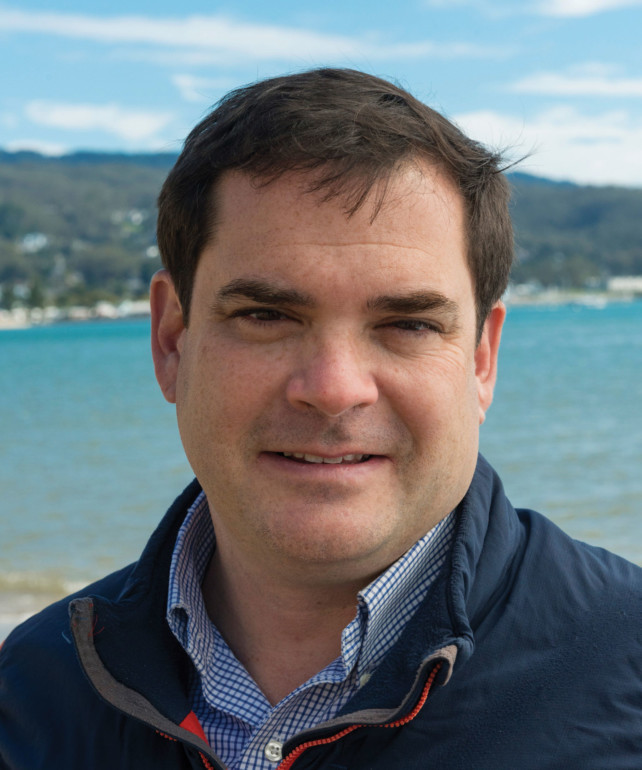
John Vandemoer spent more than a decade as Stanford University’s sailing coach before he was conned by college placement counselor Rick Singer, who had approached him under the guise of helping a sailing program that needed both donations and help finding recruits to stay afloat.
He was unwittingly caught up in the “Varsity Blues” scandal, which affected many across Marin and the Bay Area. At Stanford, Singer provided no strings attached donations to the sailing coach, and offered up potential students whose families would provide direct funding themselves. Raising funds for the program was part of Vandemoer’s job, so accepted these donations, with the knowledge and approval of other Stanford staff. He never pocketed any of the money himself, unlike every other college coach caught up in this scandal.
Because of this, Vandemoer had to give up a job that he was passionate about, experience some terrifying run-ins with the FBI and face criminal charges. Rigged Justice: How the College Admissions Scandal Ruined an Innocent Man’s Life gives a harrowing account of Vandemoer’s experience, taking the reader through each perplexing and stressful moment as the scandal unfolds. Ultimately, it highlights the many failings of both the admissions system and the justice system – university admissions, policies about donations, and how innocent people caught up in the criminal system can easily get drawn into compromising situations.
Here, Vandemoer talks about his book:
Did you ever think you’d do something like write a book before? Why did you decide that’s the best way to tell your story?
I never thought I’d be an author; no. I was told by a smart person you have two choices to tell your story: you can write a book or you can tell it to the media like The New York Times. But it’s going to be the story they want to tell, not your story.
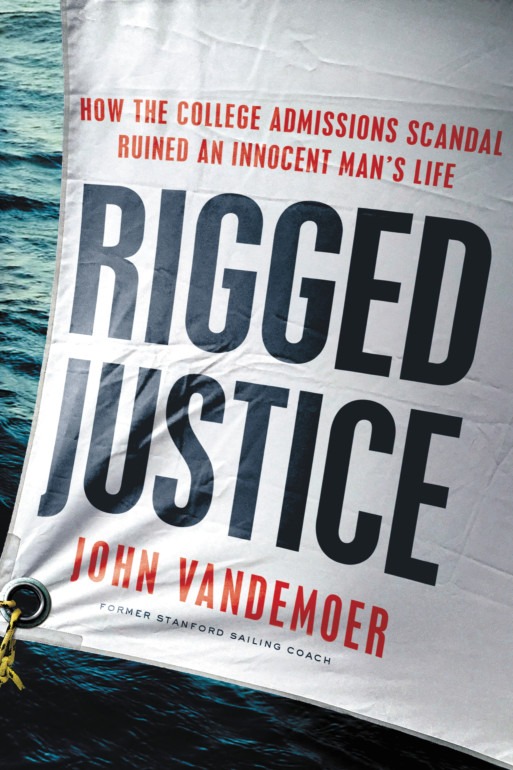
What was the process of writing the book like? Was it cathartic to revisit these events?
John Vandemoer (JV): Yes. I’d get up at 5 a.m. and just talk into my phone for two hours in the morning and walk on the beach. It was also tough. There were times I tried to hide myself, and I had to let myself be vulnerable. I would have other people read it and help me grow through it.
You speak in the book about sailors having the “Corinthian spirit.” Do you think your training helped you get through this experience?
JV: Sailing is a community of teamwork and friendship. I really leaned on my friends; they helped me get through everything. Secondly, being part of a sport, you have to accept failure. This was a big issue and a big failure, so I had to treat it in some ways like I was a coach giving a player advice. You have to be able to pick yourself up and grow from it.
Stanford didn’t stand by you when you were charged. Have they done anything to help prevent this from happening again?
JV: I’m biased obviously, but Stanford took the approach that made coaches the bad guys. Stanford took the approach that basically made coaches the bad guys. I only know through the press releases, but they have talked about having a third party review recruits. It may work, but you need to understand a sailing resume, and coaches from other sports aren’t going to. Ultimately, coaches need to be protected.
How you had to take a plea deal exposes a dark part of the American justice system. What can people do in these situations, and what needs to be changed?
JV: First and foremost, you should never let the FBI into your house. That’s how I started my book, where the FBI come to my house. It’s brutal dealing with the FBI.
I don’t want people to not trust law enforcement, but you need to be able to exercise and know your rights. It’s also about having the right people in charge of the prosecution. Prosecutors are given the ultimate power in key cases. Plea deals shouldn’t go away, it just needs to be done for the right reasons.
What do you think was wrong with the university system that let Rick Singer exploit it?
JV: The Netflix documentary I was in about this was really fascinating. Everyone is trying to go to the same schools, so it’s completely set up for exploitation. It needs to become acceptable to just go to your very good state school. The universities are very good at marketing and playing off the brand name. The other part is the money issue. The U.S. News & World Report rankings use a formula based on fundraising and how many resources you have. I understand the need to fundraise, but enough is enough.
More New Reads
Baobab by Beth Moon
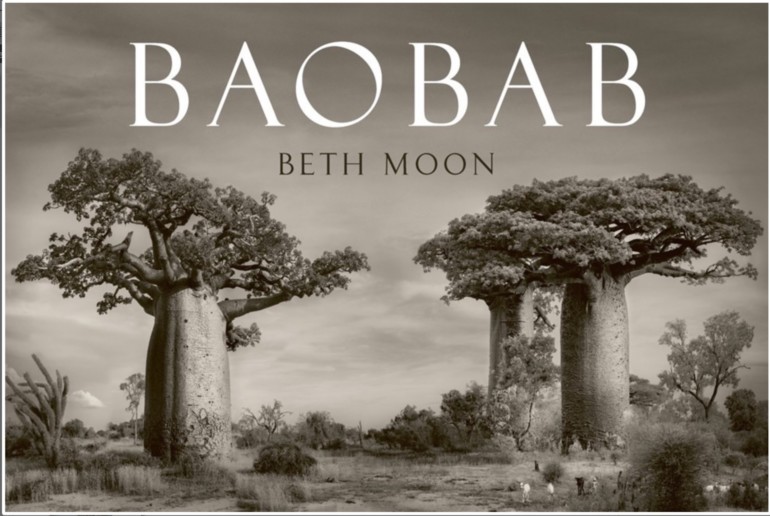
Baobabs are one of Africa’s natural wonders: they can live more than 2,500 years, and their massive, water-storing trunks can grow to more than one hundred feet in circumference. They also serve as a renewable source of food, fiber, and fuel, as well as a focus of spiritual life. But now, suddenly, the largest baobabs are dying off, literally collapsing under their own weight. Scientists believe these ancient giants are being dehydrated by drought and higher temperatures, likely the result of climate change. This spectacular, oversized photo book celebrates Africa’s most majestic trees, now facing an unprecedented ecological threat.
Photographer Beth Moon, responsible for some of the most indelible images of Africa’s oldest and largest baobabs, has undertaken a new photographic pilgrimage to bear witness to this environmental catastrophe and document the baobabs that still survive. In this oversize volume, she presents breathtaking new duotone tree portraits of the baobabs of Madagascar, Senegal, and South Africa.
The San Francisco Bay area photographer has gained international recognition for her large-scale, richly toned platinum-palladium prints. Her other books include Ancient Trees: Portraits of Time; Ancient Skies, Ancient Trees; and Literary Chickens.
See Moon in person at Book Passage Corte Madera on Dec. 4 at 1:00 p.m along with our frequent contributor, Kirsten Jones Neff.
The Lone Ranger and Tonto Meet Buddha by Peter Coyote
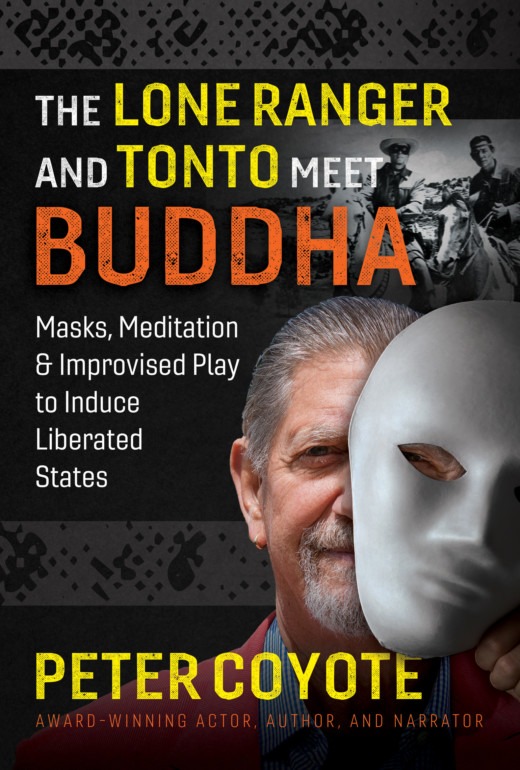
In The Lone Ranger and Tonto Meet Buddha, award-winning actor, narrator, and Zen Buddhist priest Peter Coyote shares a series of mindfulness techniques and acting exercises that show how malleable the self can be. Coyote uses masks, meditation, and improvisation to teach others how to free themselves from fixed ideas of who they think they are in order to release the ego from constant defensive strategizing, calm the mind’s overactivity, and allow spontaneous playfulness to arise out of your deepest nature. Developed through 40 years of research and personal study, Coyote’s synthesis of mask-based improv games and Zen practices is specifically designed to create an ego-suppressed state, akin to the mystical experiences of meditation or the spiritual awakenings of psychedelics.
Likening the liberated state induced by mask-work to “Enlightenment-lite,” Coyote draws on Buddhist philosophy to describe how and why the exercises work as well as how to make your newly awakened and confident self part of daily life. In true Zen form, woven throughout the narrative is a lighthearted parable of an out-of-work Lone Ranger and Tonto, who meet Buddha and experience spiritual awakening.
Peter Coyote is an award-winning actor, author, director, screenwriter, and narrator who has worked with some of the world’s most distinguished filmmakers. Recognized for his narration work, he narrated the PBS series The Pacific Century, winning an Emmy award, as well as eight Ken Burns documentaries, including The Roosevelts, for which he won a second Emmy. In 2011 he was ordained as a Zen Buddhist priest and in 2015 received “transmission” from his teacher, making him an independent Zen teacher. The author of several books, he lives in northern California.
Coyote will be in conversation with Anne Lamott online at Book Passage on Dec. 9 at 5:30 p.m.
Adventurous Lives, Daring Acts: True Stories of the Famous and Forgotten by Jim Holden
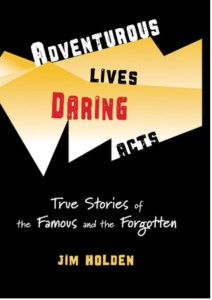
In his new book, local author Jim Holden introduces us to unique men and women of daring who have left distinctive marks on our country’s culture and land. He presents the last unconquered Native American as he steps from the wild into twentieth century California; takes us atop the planet’s tallest redwoods, and we feel John Steinbeck’s raw emotions as he emerges into fame and then plunges into despair. We accompany impresario Bill Graham as he transforms rock ‘n’ roll and the sixties; escape from San Quentin and other prisons with America’s premier prison escape artist, and join Jack London on his many dangerous adventures.
Jim Holden has been enchanted by the singular history, natural beauty, and astounding stories of the greater Bay Area, California, and the Western States for more than 50 years. He relishes hiking, travel, and nature. His previous book, It Happened in Marin, was a local best seller. He lives with his wife Mary in San Rafael, California.
Holden will appear in person at Book Passage Corte Madera on Dec. 5 at 4:00 p.m.
Reviews by Paula Farmer of Book Passage.
More from Marin:
- The Postmistress of Paris: A WWII Drama Celebrating a Heroine Who Saved Parisians from the Nazis
- A Sanctuary for Thought-Provoking, Society-Changing Writing: Mesa Refuge in West Marin
- Amy Tan Talks Family History, Teaching a MasterClass, and Being in a Band With Dave Barry at The Sonoma Valley Author’s Festival
 Jessica Gliddon is the Senior Digital Editor for Make It Better Media Group. An international writer and editor, she has worked on publications in the UK, Dubai and Cape Town. She is a graduate of UC Santa Cruz, and is the former editor of Abu Dhabi’s airline magazine, Etihad Inflight. When she’s not checking out the latest exhibit at SFMOMA or searching out the best places to eat and drink near her home in San Francisco, she volunteers at the Marine Mammal Center in Sausalito.
Jessica Gliddon is the Senior Digital Editor for Make It Better Media Group. An international writer and editor, she has worked on publications in the UK, Dubai and Cape Town. She is a graduate of UC Santa Cruz, and is the former editor of Abu Dhabi’s airline magazine, Etihad Inflight. When she’s not checking out the latest exhibit at SFMOMA or searching out the best places to eat and drink near her home in San Francisco, she volunteers at the Marine Mammal Center in Sausalito.

